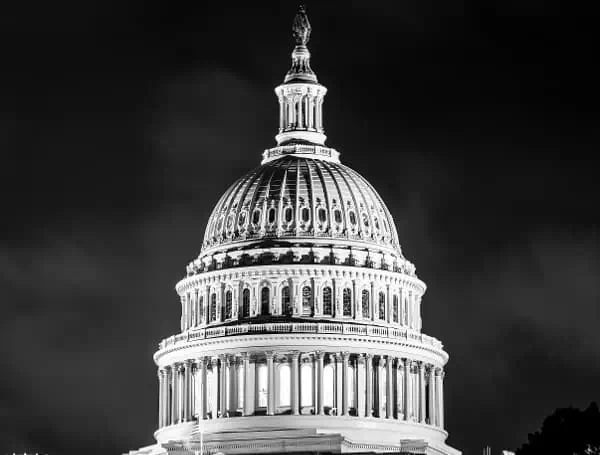The Senate and House of Representatives are unlikely to pass all 12 appropriations bills to fund the government for the current fiscal year before the next deadline for a shutdown, legislative experts told the Daily Caller News Foundation.
House Republicans under Kevin McCarthy’s speakership initially vowed to pass 12 separate bills to fund the government, as opposed to year-end omnibus spending packages, which often run into thousands of pages, for greater accountability of public spending.
However, the House has adjourned for a December recess covering Christmas and New Year’s Day, leaving less than 20 days for both houses of Congress to pass all 12 bills when they return, making it unlikely to be completed.
Read: Young GOP Voters Tell Pollster That Tucker And Vivek Are Their Top Choices For Trump’s No. 2
“It’s possible but highly unlikely. There’s nothing procedurally preventing the House from adopting all 12 bills. But given the disagreements in their conference, it would require a shocking turn of events to pull it off,” said Dr. Joshua Huder, a senior fellow of The Government Affairs Institute at Georgetown University to the Daily Caller News Foundation.
“There is really no way that I see that this process can move forward without a government shutdown unless you have a continuing resolution. There just is not the time to do the work that’s necessary to get the bills done,” said Mark Harkins, another senior fellow of The Government Affairs Institute, to the DCNF. “This process is going to take weeks, not days…and they don’t have weeks when they come back, they have days.”
The House began a period of district work on Dec. 15 and will remain out of session until Jan. 9, a three-week recess that will leave them with just ten days to pass five more appropriations bills — related to the departments of Agriculture, Commerce, Justice, Labor, Transportation and the White House. They must also conclude conference negotiations with the Senate on seven others, four of which the Senate has not taken up.
“Among the slim majority in the House, there does not seem to be widespread agreement on how to proceed with reducing government expenditures,” wrote E.J. Antoni, a public finance economist with The Heritage Foundation, to the DCNF. Several appropriations bills had been scheduled for a vote in November but were yanked from the floor amid a lack of support from enough House Republicans amid unanimous opposition from House Democrats.
Read: GOP Lawmakers From Georgia, Arizona, And Pennsylvania Seek To Yank Biden From Ballot
The time crunch and disagreements among Republicans raise the likelihood that members will have to combine all appropriations bills into one omnibus spending bill, which they have strongly opposed.
“Congress has created for itself a mad dash to avoid a government shutdown. Rushed lawmaking of this kind, especially in a divided government, incentivizes fiscal irresponsibility and logrolling,” wrote David McGarry, a policy analyst at the Taxpayers Protection Alliance, to the DCNF. “[This] usually leads to big spending or the can being kicked further down the road with a continuing resolution.”
House Speaker Mike Johnson has vowed that the House will not consider another continuing resolution, according to a letter shared by his office with the DCNF. Should Johnson uphold this vow, apart from passing all 12 bills, only an omnibus spending package will be able to avert a partial government shutdown on Jan. 19.
“Appropriations staff can write a bill fairly quickly, within a few days, as long as they know what number they’re writing to. [The House and Senate] do not have an agreed number for what the amount of the appropriations bills, the 12 of them added together, should total,” said Harkins, indicating the wide differences between both chambers on this matter. He suggested that House conservatives, who have been pressing for stringent cuts, may only be persuadable when the government shuts down.
“We’ve got to shut down the government for a bit to prove to the conservative element[s]…’If you’re unwilling to compromise at all, we can’t get anywhere,’” he noted.
Some experts believe that Johnson can get all 12 bills passed before their respective deadlines, though it will require significant concessions to Senate Democrats that the House, so far, has been unwilling to make. “If all 12 appropriations bills leave the House chamber before their deadlines, it’s likely that they will not have cut enough spending and will be passed with support from liberals,” Antoni said.
“You’re going to see an aggressive schedule in the days and weeks ahead,” Johnson had said in his first press conference after being elected as the speaker. “You’re going to see Congress working as hard as it’s ever worked and we’re going to deliver for the American people.
Senate Majority Leader Chuck Schumer did not immediately respond to the DCNF’s request for comment.
Android Users, Click To Download The Free Press App And Never Miss A Story. Follow Us On Facebook and Twitter. Sign up for our free newsletter.
We can’t do this without your help. Visit our GiveSendGo page and donate any dollar amount; every penny helps.

